Keyword research is a fundamental part of SEO. Although Google’s algorithm uses over 200 ranking factors to rank websites, keywords remain one of the most important things to get right.
Keywords form the foundation of effective SEO. They’re vital for helping you get the right web pages and content indexed, attracting the right traffic to your website, and guiding your content marketing plan.
So before you start executing a content plan and refining your site for SEO, you’ll need to have a solid understanding of what keywords are most valuable for your website.
In this guide, we’ll cover everything you need to know about keyword research and how to do it.
What are Keywords?
Keywords are the terms and phrases that people enter into search engines. Strategic keyword research is an essential part of SEO. For the user, a keyword describes the content they want to find or the question they want an answer to. For marketers, keywords help tell search engines what your content is about.
Incorporating keywords into your content marketing strategy is vital for successful SEO. It helps you target your content towards specific queries, which gets your pages to rank for the right search terms.
Strategic keyword research is often the first step in developing an effective SEO strategy. This helps you determine the kind of content you’re going to publish, and how you’re going to draw visitors to your website.
Why is Keyword Research Important for SEO?
Keyword research is essential for guiding your SEO strategy in the right direction. The keywords present on your website determine how your pages get indexed and what your business is all about. These keywords are what visitors who land on your website are interested in, and they determine how your web pages appear on search engine results pages (SERPs).
Strategic keyword research is all about finding the best keywords to target. The keyword research process should also reveal valuable insights about these keywords, to help you gain more insights into your target audience and content strategy.
The whole point of using keywords in content marketing is to get your content in front of the right people. Basically, you want to optimize your pages around the terms your target audience is searching for. This can help you draw your exact target audience to your site.
The inbound marketing methodology is all about drawing your audience towards your website by publishing content that they want to discover. Effective keyword research helps you create this kind of content.
Quite simply, without doing proper keyword research, your content strategy will be misguided. You may end up ranking for search terms that are irrelevant to your website. In fact, without keyword research and optimization, you might not rank for search terms at all.
This means effective keyword research helps you attract targeted traffic to your website.
To go more into detail, let’s break down some of the main advantages of doing keyword research.
Increased Traffic Potential
Strategic keyword research helps you identify a wider scope of opportunities to publish content to rank for. This will increase the traffic potential of your website.
Enhances Customer Acquisition
Keyword research helps you attract potential customers to your website by providing the answers they’re looking for in their specific stage of the buying journey. By publishing valuable content based on these keywords, you can try to get these visitors to click on a CTA in your content, and move them further down your marketing funnel.
Keywords Provide Insights
Researching keywords within your niche can help you identify industry trends and insights about your audience. This can be useful for guiding your overall marketing strategy and coming up with unique content ideas.
Ensures Your Content is Visible
Researching keywords and optimizing your content around them will help search engines index your content for the right search terms. This will make your content more visible to the right people.
Understanding the Elements Of Keyword Research
Keyword research is a process that involves a lot more than simply finding what search terms your target audience is using. Here are three critical elements of keywords that you’ll need to consider when researching them.
Make sure that each of these elements aligns with the other when choosing the perfect keywords for your brand.
Search Intent
Search intent refers to what kind of content or information the user wants to find out when they search for a specific keyword. To understand search intent, you’ll need to do some research into the keyword and the kind of topics and pages that rank at the top spots for the keyword.
Search engines understand relevancy, so your content will only rank for a keyword if it is relevant to what the user wants to find out. Understanding search intent is also vital for choosing the right keywords that attract the right people. The longer and more detailed the keyword is, the more specific the intent will be.
For example, the keyword “hiking” could reveal a wide range of web pages. This could cover a definition of what hiking is, hiking trails near the user, or hiking boots for sale. If you further refine the keyword, into something like “best hiking trails” or “cheap hiking boots”, the search intent becomes a lot more obvious.
It’s essential to get inside the mind of your ideal customer and understand exactly what they want to find out. This will help you select keywords that match their search intent.
If your content doesn’t match the search intent of your keyword, then you’ll struggle to gain any meaningful traffic from your keyword.
Search Volume
Search volume represents how many times your keyword is searched for within a month. This is one of the most important metrics involved in keyword research. Many keyword research tools will let you choose monthly search volume based on specific audiences (geographical locations).
You might end up ranking at the number one position for a keyword, but if nobody searches for that keyword, you won’t end up getting any traffic. This means search volume offers a rough insight into how much potential traffic your keyword might be able to bring you.
Just be aware that the more popular a keyword is (high search volume), the more competitive the keyword will also be.
Keyword Difficulty
Keyword difficulty refers to how competitive and difficult it will be to rank for certain keywords. The more in-demand and valuable a keyword will be, the more difficult it will be to rank for it.
If you want to rank at the top position for a difficult keyword, then your website will need to prove that it’s more authoritative on the subject than other websites. This is achieved by offering detailed, insightful content, and generating high-quality backlinks and social signals.
Always search for your keyword first and look at the sites that are ranking at the top spots. Will you be able to compete with these websites? If not, then consider trying to target a slightly less competitive keyword. Alternatively, invest in making your content truly exceptional.
Long vs Short Keywords
This is not an element of keyword research so much as it’s just the two different types of keywords you can use: long-tail and short-tail. A short-tail keyword would be something like “ice cream” while a long-tail keyword would be “healthy vanilla ice cream recipe”.
Long-tail keywords are more specific and offer more insights into user intent. However, they have a lower monthly search volume.
It’s important to understand these different types of keywords when conducting keyword research. Great pieces of content often target and rank for both long-tail and short-tail keywords.
How to Do Keyword Research for Your SEO Strategy in 3 Steps
A solid content marketing strategy starts with the right keyword research process. Here is a step-by-step framework that you can use to research keywords that are the perfect fit for your brand.
- Create a List Of Relevant Topics
Start by writing down a list of relevant topics that relate to your business or website. These topics should cover what your website does, what you’re good at, and what topics you think are important to your business and audience. These will form your general topic pillars, which you will use to research keywords.
These topics could be the questions that come up most in sales conversations, the kind of products your business sells, or the topics you most frequently cover in your existing marketing strategy.
Put yourself in the shoes of your customers and understand what kind of general topics they would be searching for in order to discover your business.
- Add Keywords to Your Topic Pillars
Now that you have established your content pillar topics, the next step is to fill these up with the keywords you want to target. These are the keywords that you have identified as being important for your business for ranking in the SERPs of the relevant topics.
You can start this off with brainstorming. For example, a content topic of yours might be “digital marketing”. Within that, you might identify the keyword “email marketing”. Now you can brainstorm some keyword variations, like “email marketing software”, or “email marketing strategy”.
Once you have established a long list of keywords, the next step is to get a bit more technical. This is where you’ll need to use a keyword research tool.
You can use various tools such as, Wordstream, Ubersuggest, Ahrefs or Semrush for keyword research and SEO capabilities. Whatever tool you use, simply type in your keyword ideas to generate the data around them. This will reveal things like the monthly search volume and difficulty.
Repeat this process for all of your topic pillars and keyword ideas until you have identified a list of keywords that make the most sense for your content strategy.
It’s always a good idea to identify more keywords than you might actually need. This can help you plan out a broad content strategy, and it also gives you room to eliminate some keywords.
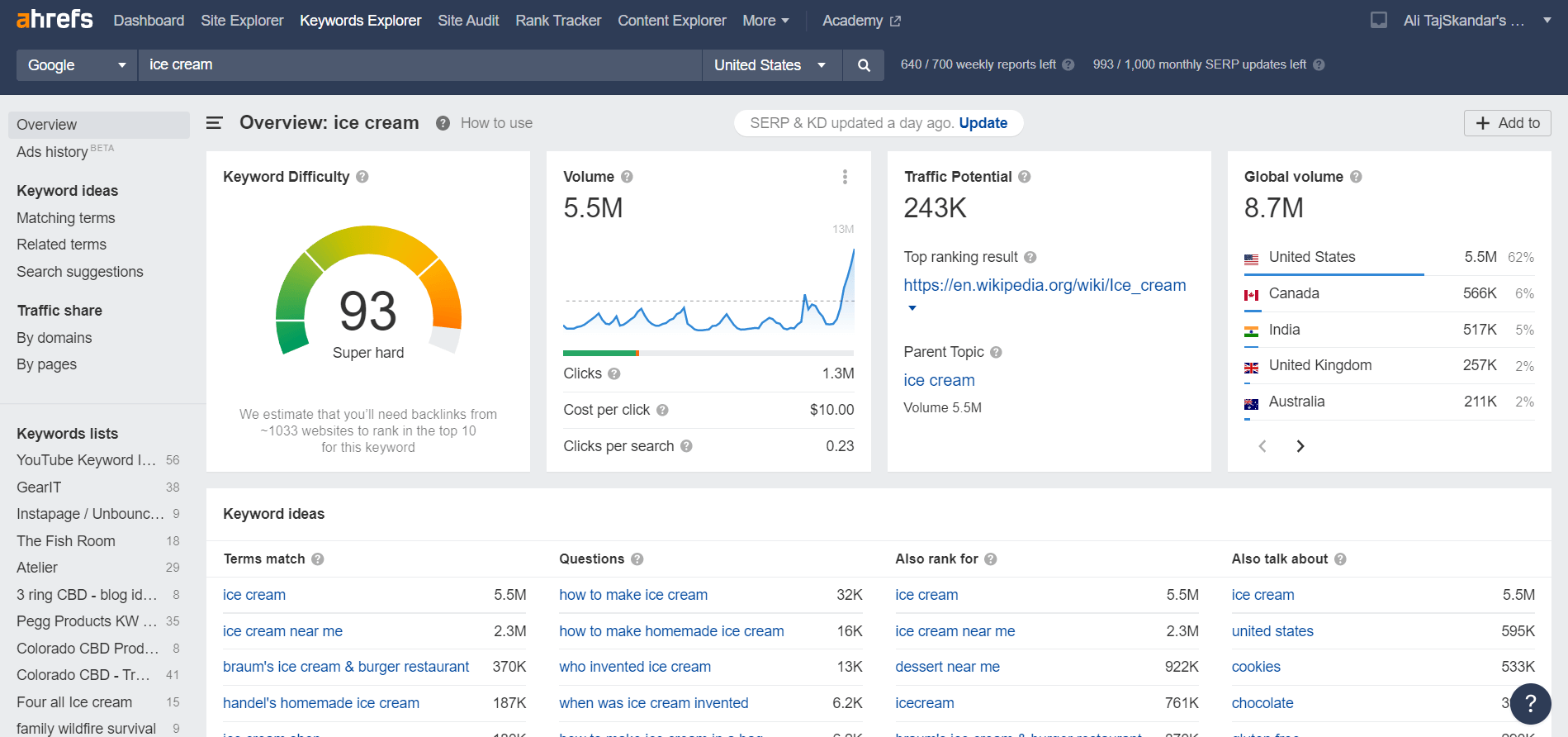
- Research Your Keywords
Once you have identified which keywords are most valuable, the next step is to understand them. Remember we spoke about search intent? This is where you dive into this.
The best first step is to simply search for your keyword in Google. Type it in, and take note of the top-ranking results. What kind of content is on offer? What angles does this content take? What questions do they cover?
This will help you understand what users want to find out when researching these keywords. Pay attention to things like the length of articles, what headings they include, and what kind of websites are dominating the search results. All of this information will help you understand the mindset and intent of your target audience.
For example, a keyword like “surfboard” will probably reveal product pages first, as this keyword has a strong commercial intent. A keyword like “what surfboard should I use” will reveal blog articles and informational content, as this will have an informational intent.
There are two other useful features that are available on Google search results pages. These are “people also ask”, and “people also search for”.
First, take a look at the related questions (“people also ask”) that are displayed on the search results page, like this:
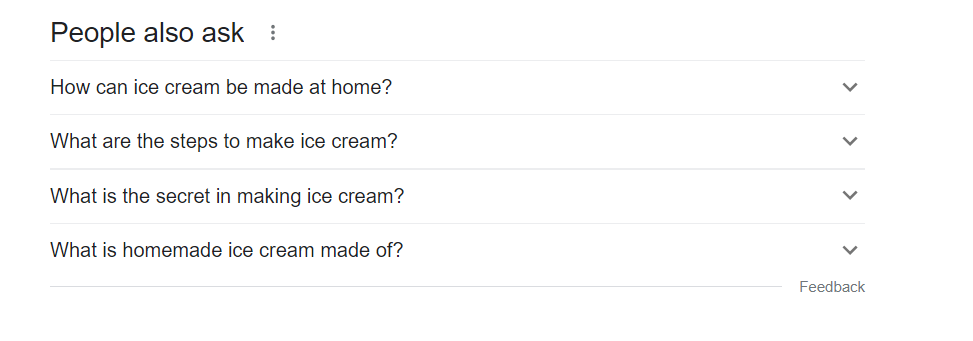
These questions can help you identify additional topics to cover in your content. These topics relate to your keywords, so they’re a useful part of keyword research.
Then scroll to the bottom of the search results page and take a look at the related search queries, like this:

Again, this reveals additional search terms, or keyword opportunities, that users are searching for in relation to your keyword. Considering all of this can help you identify new keyword opportunities, or simply give you more insights into user intent and how you can make your content more valuable.
Other Keyword Research Strategies
The three-step keyword research strategy above is a helpful way to manually find keywords for your website. While this is a great starting point, there are other strategies you can use to go even deeper into keyword research.
- Perform a Gap Analysis
A gap analysis is a great way to discover valuable keyword opportunities for your website. This is a process where you compare your keyword rankings to the keyword rankings of a competitor’s domain. The process reveals what missing opportunities, or gaps, your website might have compared to your competitors.
Start by creating a short list of your top competitors. Then enter them into the keyword tool’s gap analysis feature.
This will create a report of all the top keyword rankings that your competitors have that your site doesn’t have. This should also reveal the kind of search volume and traffic opportunities that these keywords might have.
A gap analysis is a great way to help you develop an SEO content strategy that ensures your competition isn’t getting the better of you. If you want to save time, let Topcontent contact do the keyword gap analysis for you.
- Competitor Research
This is a bit more simple than performing a gap analysis, but finding your SEO competitors it’s still one of the best keyword research strategies. The process simply involves taking a deep dive into your competitor’s sites and seeing what type of content they’re publishing. This can help you identify keyword and content opportunities that you may have missed out on.
You can do this the simple way by scrolling through your competitors’ blogs and seeing what topics they cover. To perform this in more detail, use an SEO tool to analyze their website.
You can simply paste their site URL into the tool, and it should be able to reveal your competitor’s top-ranking pages and what organic search queries these pages attract.
- Know What Keywords Your Website is Already Getting Traffic For
Another excellent and underrated keyword research strategy is to identify keywords that already exist on your website that you might not know about. You can use a tool like Google Search Console (free) to discover what search terms bring visitors to your site. You can do this as a broad overview of your website or blog, or you can do this for specific pages.
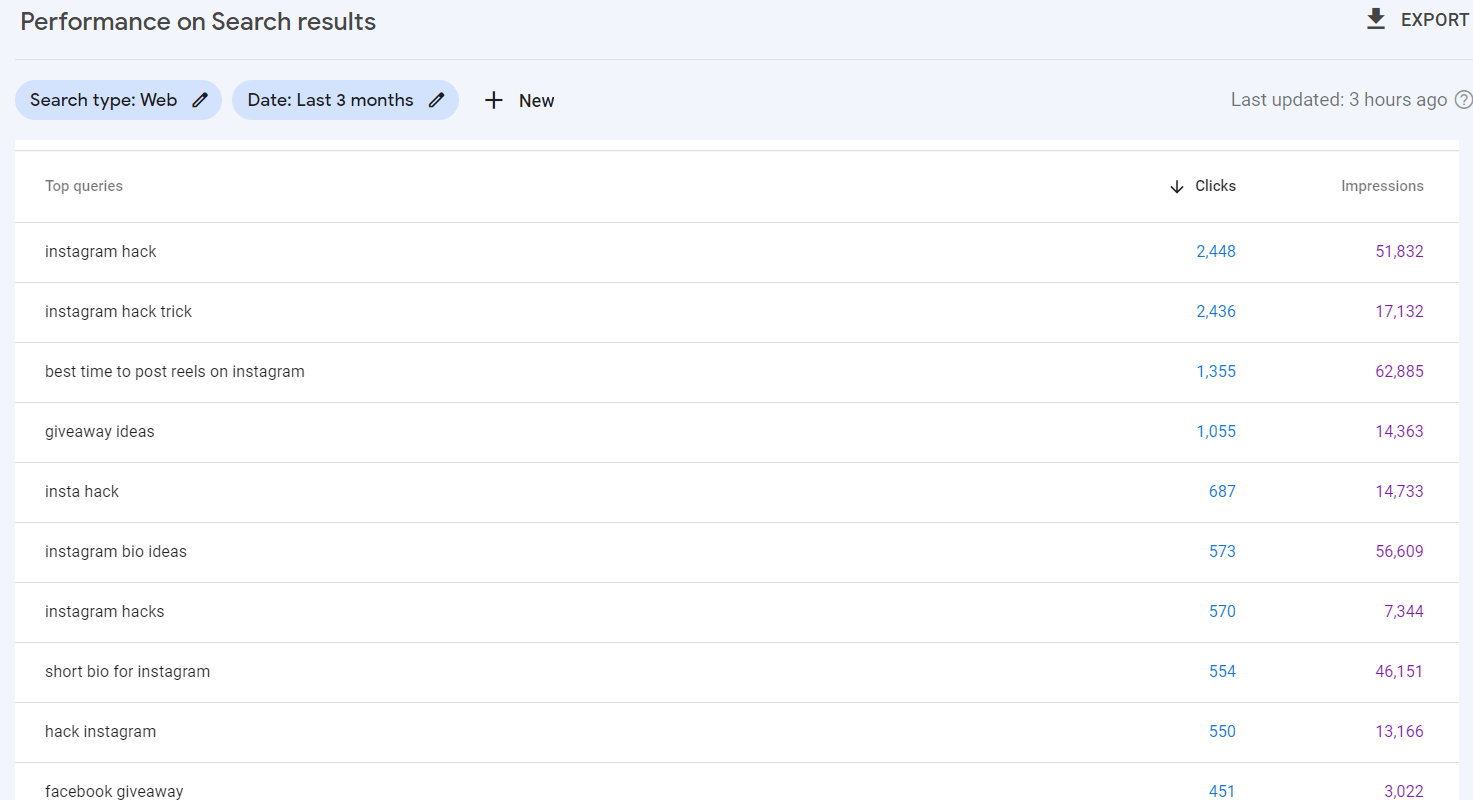
In many cases, web pages will actually be ranking for a number of different keywords. You might see search terms on this list that you didn’t intend to rank for, but offer good opportunities for your site. If this is the case, you can further optimize these pages to better match these keywords, or create new content based on these keywords.
Tips for Keyword Research
While keyword research is a relatively straightforward process, it can take some time to truly master it for your website. To help you out, here are some useful tips and tricks that you can use when researching keywords.
Identify Low-Hanging Fruit
Keyword research can be a very frustrating process if none of your content ever ranks for the keyword. This is often the case if you choose keywords that are too difficult and competitive.
To combat this, try to identify easy keyword opportunities that could deliver fast rankings. These are low-hanging fruit, and they can be a great way to kick off and boost your SEO strategy.
Instead of trying to target a high-volume keyword that you’ll never rank for, rather win the SERPs with a low-volume keyword. Your traffic potential might be lower, but at least you’ll get some traffic. This will also help to develop more credibility and authority around your website, which can help with more competitive keywords later down the line.
Understand all the SERP Features
As we already mentioned, there’s a lot more to SERPs than just indexed web pages. There are also features like:
- Paragraph snippets (also known as “position zero”):
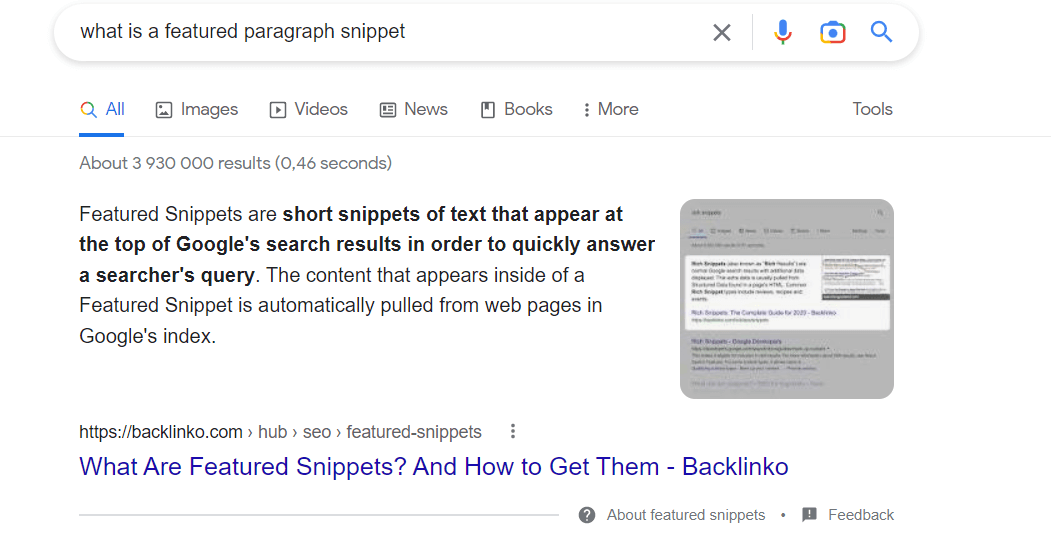
- List snippets:

- Video snippets:
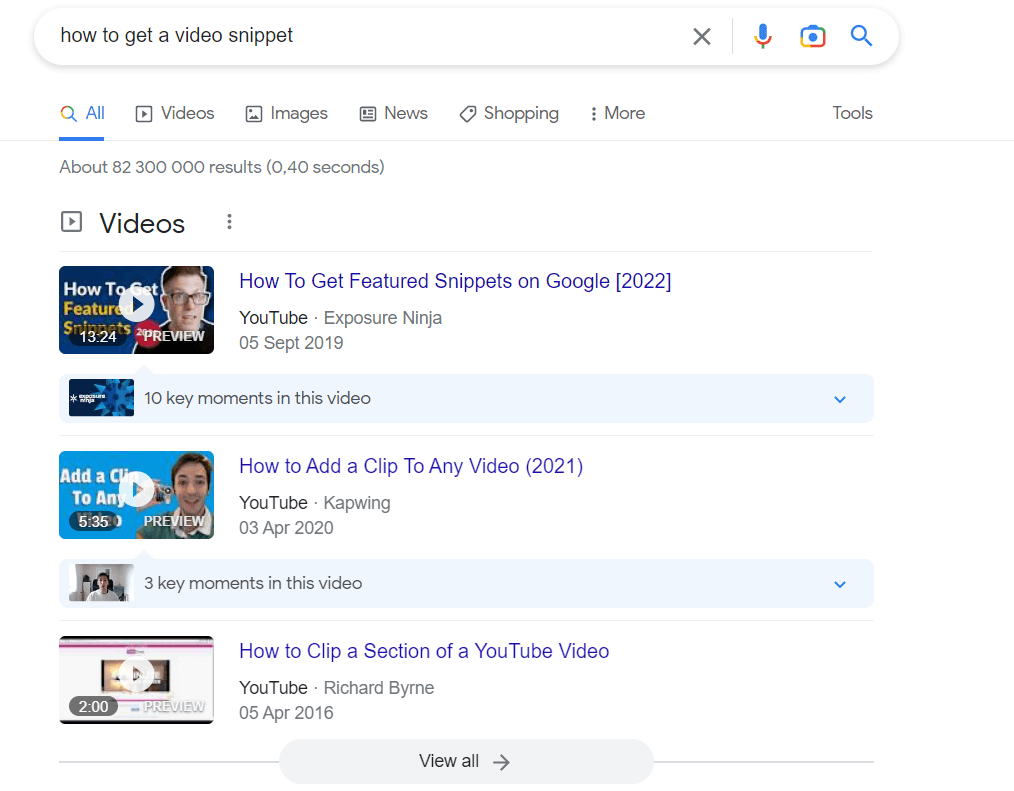
All of these are opportunities for you to publish content that attracts traffic. They’re also great ways to identify valuable keywords and enrich your content strategy.
If you use these SERP features correctly, Google might highlight them for you. So, when researching your keyword, pay attention to these features and see if any opportunities exist for your brand.
Create a Healthy Mix Of Keywords
A powerful content strategy will include a wide range of keywords. This should cover high-volume keywords, as well as more specific long-tail keywords, as we’ve already discussed. Make sure you incorporate both into your content strategy.
Using tools like Google Trends and Google Keyword Planner is a helpful way to identify topics and keywords that are worth focusing on, and ones that are worth ignoring.
Ideally, you’ll want to identify keywords that have a lot of interest and search volume, but minimal competition. Don’t be too ambitious about your keyword choices, but don’t be too modest either. It’s all about striking a balance.
Make the Most Of Your Keyword Research
Once you have completed your keyword research, make sure that you know how to utilize this data.
Of course, you can use keywords on your web pages and in your blog posts to help guide your strategy and enhance your SEO efforts. However, you can also use keywords for video marketing (YouTube), ads strategies, and even to offer ideas for content on social media or podcasts.
Also, ensure you factor your keywords into your backlinking and internal linking strategies. This is important for helping you get more SEO juice from each keyword.
Summary
Understanding keyword research is vital for any effective SEO strategy. Keyword research helps you find the opportunities you need to optimize your site and attract more traffic. Get it right, and you’ll be able to see a big difference in how your website performs. You can monitor your SEO performance by tracking the most important SEO KPIs.
The tips and strategies above are some of the most important things you need to know about getting started with keyword research. However, SEO is always an ongoing process. The best approach is to continually research, analyze, and optimize your site for new keyword opportunities. The more you do this, the more potential traffic you should be able to bring in.
